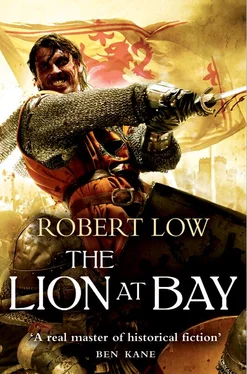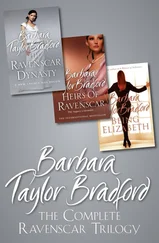Back at Herdmanston, Hal said, it would be the barley harvest, the big one of the year. With luck, he told her, there would be no scab on sheep, or foot-rot, or cracked udders on cattle, or staggers or overlaid pigs. Even as he spoke, he felt the crushing weight of knowing that there were too many men away from home and not enough to get the harvest in, a tragedy repeated across every homestead in Scotland.
Every day the sky was faded blue, streaked with thin, cheese-muslin clouds. The barley and rye was ripening, waiting to be reaped, tied and winnowed without blight or burning, just enough rain had fallen to turn the millwheels and fill the rain-butts. Yet the land was empty, for everyone was with the army.
Yet the memory of Herdmanston bleared him as he spoke. You will, he told her, feel the first breath of autumn, cool, but not cold. It would be a place of precious metals, the sun shining through a soft silver, lying green-gold on the harvest fields. In a sea of haze, great iron bull’s head clouds would float up from the west and the breeze, he added, has a trick of rising suddenly, running through the trees.
She listened, marvelling at the change in him when he spoke of the place, finding that same strange leap deep in her.
There would be sunsets, he began to tell her – then stopped, remembering the last one he had seen, etching the stone cross stark against the dying blaze of day.
She knew of the dead wife and son from others.
‘What killed them?’ she asked and the concern in her voice robbed it of sting.
‘Ague,’ Hal answered dully. ‘Quartan fever – she died of the same disease as Queen Eleanor, my boy a week after his mother. I had the idea for the stone cross from all the ones the king put up for her.’
‘Longshanks loved her,’ Isabel said, ‘hard man though he is.’
‘Aye,’ Hal said and shook himself from the memories. ‘We share that pain, if little else.’
‘One other thing you share,’ Isabel said impishly, ‘is a horse. The king’s favourite horse is Bayard and the Balius you ride is from the same stock.’
Bayard, Hal knew, was the name of a magical bay from children’s stories, a redhead with a heart of gold and the mind of a fox and would have been a good name for Isabel herself. He said as much and she threw back her head and laughed aloud, a marvellous construct of white throat and rill that left Hal grinning, slack and foolish.
‘I heard he rode Bayard at Berwick,’ Sim growled, coming up in time to hear this last, crashing into it like a bull through a bad gate. ‘Leaped the wood and earth rampart and led his men in for the slaughter, so it is said. We are nearly at St Mary’s Wynd – do we cross the brig and join the rebels up on Abbey Craig?’
‘Join the rebels,’ she had said and laughed.
Hal shook himself from his revery, back to the present. Easy for you to laugh, Lady, he thought bitterly, who are never done rebelling, one way or another. Yet I have been charged to see you safe and so it must be …
Wallace had nodded off and Hal felt a sharp sympathy with the sleeping giant, hair spilling over his face, one grimed fist a finger-length from the hilt of the hand-and-a-half. Keeping all these men together was a hard enough task, never mind trying to turn them from fighters into soldiers, trying to outthink the enemy, trying to plan how to win a battle against the finest cavalry in the world.
Join the rebels. By God, not again, Hal thought. Bringing the Countess here was the safest course for her, Hal thought, since her husband was a Comyn and so more kin to the rebels than English Edward. Now that it was done …
He stepped out into the night air, hearing the strange, wild sound of sythole and viel and folk wheeching and hooching in a dance, as if tomorrow was just another day, with time enough to work off a bad head. The world was racing towards dawn and Hal felt a leap of panic to be away from here before light …
‘Let us hope they dance as well the morn,’ said a voice and Hal spun to where Moray stepped from the shadows. He was young, thick-necked and barrel-trunked and would go to fat like his da, Hal thought, when he got older. For now, though, he was a solid, formidable shape in fine wool tunic and a surcoat with a blue shield and three stars bright on it, even in the dark. Behind him came the foreign knight who spoke French but was Flemish with some outlandish name Hal scourged himself to remember.
‘He’s asleep,’ Hal said jerking his head back into the tent. Moray nodded and shrugged.
‘No matter, the ring is arranged and all that remains is for us to take our partners and jig.’ Moray said, breaking into French for the benefit of his companion, then paused, a smile, half-affection, half bitter rue on his face.
‘I came to make sure The Wallace followed the steps,’ he added. ‘He has a habit of dancing away to his own tune.’
‘Will you join us tomorrow, Lord Henry?’ the foreign knight asked and Hal blinked, then realised the knight – Berowald, he remembered suddenly, Berowald de Moravia, the Flemish kin of the Morays – was inviting him to be part of the hundred or so horse, all that the Scots army possessed and almost none of it heavy warhorsed knights and serjeants.
He shook his head so vehemently he thought it might fall off. Balius belonged to Buchan and could not be risked in a battle like this, he babbled, while Griff was too light to be of much use. Andrew Moray nodded when this was laid out.
‘Aye, well, it will be a painful dunt of a day,’ he declared grimly, then nodded to Berowald as he spoke to Hal.
‘The winning of it,’ he added in French, ‘will depend on the foot and not the horse, for all my kinsman here wishes it otherwise.’
Berowald said nothing, but the scowl spoke of his distrust at relying on ragged-arsed foot soldiers who were wildly dancing away the night before they had to stand and face the English horse. A thousand lances, Hal had heard, and he shivered. A thousand lances would do it – Christ, half that would plough them under, he thought.
He thought of Isabel and what would happen to the camp and the women and bairns in it if the battle was lost and panicked at that – the pull of her was iron to a lodestone.
She was in with the Grey Monks, the Tironensians from Selkirk, who had made a good shelter from tree branches and tent cloth, consecrating it into both a chapel and a spital for the sick and, soon, the dying. Hal found her arguing with a frowning cowl about how best to treat belly disease.
‘Chew the laurel leaves, swallow the juice and place the mulch on the navel,’ she said wearily. ‘He chews the leaves and swallows, not you. I would not stray far from the jakes now if I were you.’
The monk, pale faced in the shadows under the cowl, nodded and reeled away; Isabel turned to Hal, raising eyes and brows to the dark. She jerked her head and he followed her to a curtained-off chamber, where, once inside, she hauled off her headcovering and scrubbed the spill of dark unbraided red-auburn hair which fell to her shoulders, like a dog scratching fleas and with every sign of enjoyment.
‘God’s Wounds, that feels good,’ she exclaimed. ‘All I need now is a chance to wash it.’
She became aware of Hal’s stare and met it, the headcovering dangling in one hand like a limp, white snakeskin. Under his frank, astonished stare she felt herself blush and became defiant.
‘So?’
‘My … I am sorry … you took me by surprise,’ Hal stammered and turned his back. She snorted and then laughed.
‘There is not much you do not know of me now, Hal. Whore of Babylon is the least of it. Unhappy wife, certes. Unhappy and spurned lover. Showing my unbound hair to man not my husband or kin is the least of it.’
Читать дальше












